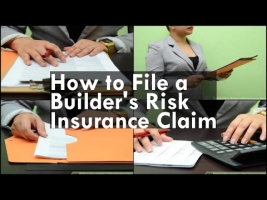Understanding Builders Risk & Construction Delay Losses
Builders risk insurance is a little known form of property insurance to the general public but plays a very important function in our economy. Little to no new construction, remodeling, or renovation of real property would be done without this unique and often complicated insurance coverage. Banks and other lenders would not make construction loans unless there was some type of insurance to protect their interest.
Insurance companies selling standard property policies understandably do not want to insure properties under construction due in part to the additional risk involved in open and often hazardous construction sites. In addition, there are the value issues as the construction progresses as well as a whole host of other things that vary from one construction project to the next. A quote from an insurance company defense lawyer perhaps best sums up this area of insurance: “Builders risk policies have been and will continue to be some of the most controversial and confusing policies to interpret and adjust.”
As in other property policies, there are choices that need to be made as to coverage before construction or for that matter before a construction loan is approved. Clearly the construction lenders as well as the developer and builder should do a lot of due diligence regarding the builders risk policy's terms and conditions. For example, who will be listed as the named insured on the policy? Are all interests such as subcontractors and construction equipment covered? Other considerations involve the type of form. Is it an all risk policy (subject to exclusions) or a named peril form covering limited cause-of–loss? Questions about the unwritten limitations in an all risk policy also need to be discussed and understood. As an example, the loss and damages must not result from intentional misconduct or fraud and the risk that is insured must be a lawful project.
A loss that happens must be a fortuitous event which so far as the parties to the contract are aware, is dependent on chance.
Workmanship exclusions may prevent coverage due to defective or faulty workmanship. Other exclusions may be design exclusions, latent defects or inherent vice exclusions. Generally exclusions found in most builders risk policies are the same as those found in regular building policies. Endorsements can be added at the time the policy is negotiated for any number of issues or concerns the parties may have regarding the unique construction project the policy is going to cover.
The question as to the amount of insurance to be covered in the policy can be problematic as values will change as construction progresses. The underwriters may offer different forms such as:
Completed Value Form
Reporting Form
Builders Risk Form
A Completed Value Form is often chosen as the insured amount starts out with the full value of the building as the policy limit. Once the amount is chosen there is no need to do anything about increasing the amounts of insurance unless there are significant design changes with increased construction costs.
A Reporting Form may require the insured to make monthly reports on values as the construction project progresses. There is some risk to this form if the insured fails to forget to report which could result in a penalty.
A Builders Risk Form makes no provision for increase in the amount of insurance. The insurance must be increased by endorsement in order to keep coverage in line with values. It has been reported that the most popular form is the Completed Value Form as it does not require the insured to focus on values as the project increases in value and thus relieves them of the reporting requirements.
One interesting issue we see with builders risk claims arises from the fact that buildings are often open when damages occur from weather related events such as hurricane and other water damage. This can be very problematic in a request for coverage from the builders risk carrier.
Often the terms in a property policy require a breach in an opening caused by a covered loss before the resulting water damage is covered. In one claim, Erica Edmondwas contacted to serve as an expert witness in a builders risk loss in excess of $40 million dollars in damages over a fee dispute between one of the parties. One of the issues in the underlining case involved a coverage dispute on the question of a breach in the building exterior (caused by a hurricane) under construction given that the building was partially completed. The insured felt that because the building was covered by plastic and other temporary cladding, that the water that entered when the plastic was blown off met the requirement of breach. The builders risk carrier said this was not a covering and thus there was no breach. In what appeared to be a close call, the judge ruled that the covering and breach (blown off plastic) allowed for a covered loss. This case illustrates the problems that may occur in builders risk policies and coverage when buildings are under construction.
Another area of insurance coverage for buildings under construction or renovation is the cost associated with a loss that delays or otherwise increases cost because of a covered loss under the builders risk policy. For example, soft cost or delay in opening can be substantial but coverage must be added to a builders risk form in order to be covered.
Measuring a delay claim/loss under a builders risk policy is very problematic and complicated. In order to have coverage, there must first be physical damage to the covered property from a covered cause of loss that results in a delay in the completion of the insured project. The delay is measured from the date the project would have been completed, had no loss occurred. There is also an assumption that repairs will be made using due diligence and dispatch.
The period of delay runs from the date a project would have been completed had no loss occurred to the date the project is actually completed. Determining the increased expenses allowed under a policy form that results from a delay can be difficult as some experts hired by the insurance company may take a different position and argue that the bills and expenses are not warranted or would have been part of the normal construction and thus not a delay claim covered item. A daily dollar rate of the loss must be agreed to and a time or period of restoration applied to come up to the amount of the loss that is owed under the delay claim section of the builders risk policy.
Other provisions in builders risk policies may include sue and labor provisions. A sue and labor provision may include what is termed Protection of Property where a typical policy may read: In the case of loss or damages, it shall be lawful and necessary for the Insured, his or their factors, servants, or assigns, to sue, labor and travel for in and about the defense, safeguard, and recovery of the insured property or any part thereof, without prejudice, to this insurance, nor shall the acts of the insured or the Company, in recovering, saving and preserving the insured Property in case of loss be considered a waiver or an acceptance of abandonment. The expense so incurred shall be borne by the Insured and the Company proportionately to the extent of their respective interests.
Sue and labor provisions encourage an insured to take the necessary steps to prevent further damage to the insured property which benefits both the insurance company and the policyholder. An interesting issue may result when a claim for cost related to sue and labor expenses is presented to the insurance company who may later raise a coverage defense to the entire claim. As a general practice, policyholders should always get agreements up front and preferably in writing following a loss so there will be no disagreements after expenses are incurred.
Generally a builders risk loss will involve many complex issues involving construction and financial questions. So it is not unusual to see outside experts (who specialize in these types of losses) brought into the claim by the insurance company. The policyholder should also arm themselves with their own experts to protect their interest.




